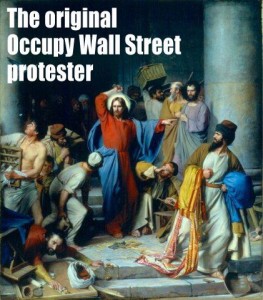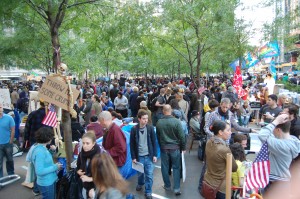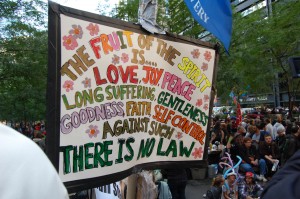Activism
A group of occupiers and flash-mobbers in Salt Lake City organized an impromptu gathering in which protesters sat outside of the Gateway shopping mall in silent meditation and prayer. As you can see from this video, the mall officers weren't too keen on the idea.
When some of these local young people heard about my event, and asked the church if they attend, the church graciously gave them free tickets. Apparently, the word spread and a big crowd of protesters descended on the already large audience. It soon became clear that Occupy Grand Rapids was in the house as they enthusiastically participated in the discussion, offering very civil, but also very challenging questions.
After the program ended, the young Occupy Grand Rapids activists asked if I would spend some time with them, to which I quickly agreed. But they also asked the Mayor to stay, and bravely, he also accepted - a decision I thought was in keeping with what a responsive democracy should look like.
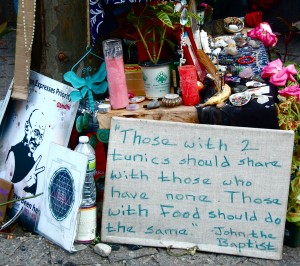 One of the constant threads in scripture is, "Give us this day our daily bread." Nothing more, nothing less. Underneath this admonition is the assumption that the more we store up for tomorrow the less people will have for today. And in a world where 1 percent of the world owns half the world's stuff, we are beginning to realize that there is enough for everyone's need, but there is not enough for everyone's greed. Lots of folks are beginning to say, "Maybe God has a different dream for the world than the Wall Street dream."
One of the constant threads in scripture is, "Give us this day our daily bread." Nothing more, nothing less. Underneath this admonition is the assumption that the more we store up for tomorrow the less people will have for today. And in a world where 1 percent of the world owns half the world's stuff, we are beginning to realize that there is enough for everyone's need, but there is not enough for everyone's greed. Lots of folks are beginning to say, "Maybe God has a different dream for the world than the Wall Street dream."
Maybe God's dream is for us to live simply so that others may simply live. Maybe God's dream is for the bankers to empty their banks and barns so folks have enough food for today.
When kids are sold for sex - there is no excuse.
That is why Jim Wallis signed onto a full page ad in the New York Times calling for Village Voice Media to shut down the "Adult Services" section of their Backpage.com website.
At 92 years old, Seeger – who was joined by 60s folk singer Arlo Guthrie, and several other musicians – marched over 30 blocks in peaceful protest, ending with a variety of musical performances, one of which involved the folk hymn “We Shall Overcome,” a song Seeger helped popularize half a century earlier.
The reason the word Evangelical has become so poisonous is because the answer to the above question comes from a conversion-based model of cultural engagement - political, theological and social. Too many Christians believe, and have wrongly been taught, that those "others" and "opposites" who have made an active choice not to believe in "our" teachings are justifiably: 1) left to their own devices as we wash our hands of them because of their bad choice (think in terms of blood-on-their-own-head); or 2) uninformed, so much so that their "no" is an illegitimate answer.
Evangelicals care more about positions -- whether progressive or conservative -- than people. We lack nuance. We have become either all Scripture or all Justice. I don't know where the balance was lost in terms of holding Scripture in high authority and, simultaneously, loving with reckless abandon?
As I read the blogs and watch the news about what's happening in New York and around the country, I can't help but wonder: If Jesus were walking the streets of New York today, would he be a rabble-rouser activist like he was at the temple, or would he walk up to the CEO of Goldman Sachs and give him a hug?
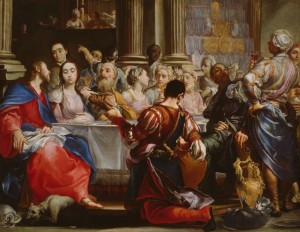
Because this week -- months after the Arab Spring, and after weeks of the growing Wall Street Occupation -- well, in this climate of discontent and dissent as we all begin to wake from our consumer induced coma to see how multi-national corporations control so much more than we can imagine, in a season when tyrants are being over thrown, I simply could not preach a sermon in which I say that God is like an angry murderous slave owning king. Maybe there is a way of finding good news in that but I just couldn't do it.
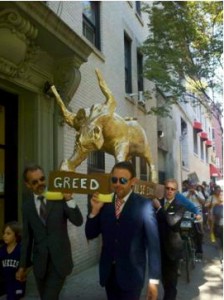 Editor’s Note: In light of the recent protests at #OccupyWallStreet and around the world, we have revisited Jim Wallis’ 2010 book Rediscovering Values: On Wall Street, Main Street, and Your Street and picked out some passages that are particularly pertinent to what we are seeing in our nation today.
Editor’s Note: In light of the recent protests at #OccupyWallStreet and around the world, we have revisited Jim Wallis’ 2010 book Rediscovering Values: On Wall Street, Main Street, and Your Street and picked out some passages that are particularly pertinent to what we are seeing in our nation today.
The Passover of the Jews was near, and Jesus went up to Jerusalem. In the temple he found people selling cattle, sheep, and doves, and the money changers seated at their tables. Making a whip of cords, he drove all of them out of the temple, both the sheep and the cattle. He also poured out the coins of the money changers and overturned their tables. He told those who were selling the doves, “Take these things out of here! Stop making my Father’s house a marketplace!” His disciples remembered that it was written, “Zeal for your house will consume me.”
– John 2:13-17
Interestingly, in his turning over of tables, Jesus specifically targeted the merchants who were selling doves. Doves were the least expensive sacrifice permitted to be offered in the temple, and, therefore, were often bought by the poorest of the pilgrims.
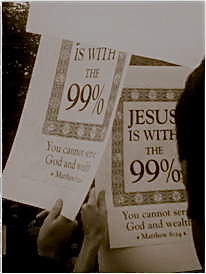
[When Jesus turns over the tables] we see a man enraged at injustice and passionately confronting those who exploit the poor. We also learn that there are some things that we all should get angry about, that there are situations where the only appropriate response is confrontation…
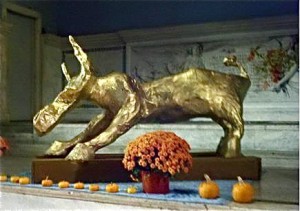 First, we were sold a lie. We were sold an illusion that promised the American Dream was as close as our next purchase. That we could pursue our selfish interests without thought to the consequences, because the “invisible hand” would work it all out in the end. We were told that we did not need to work for wealth, that it would come if only we put our money in the hands of the right stock broker, mutual fund, or stock…
First, we were sold a lie. We were sold an illusion that promised the American Dream was as close as our next purchase. That we could pursue our selfish interests without thought to the consequences, because the “invisible hand” would work it all out in the end. We were told that we did not need to work for wealth, that it would come if only we put our money in the hands of the right stock broker, mutual fund, or stock…
Second, the rules of the game failed. It was supposed to be simple. Work hard, get ahead, buy a home, and tuck some money away for the future in a 401(k). If you followed those rules, everything would work in your favor. But good jobs have disappeared, wages have been garnished, and 401(k) savings have disappeared. The rules of the game seem to have worked for those who set the rules, but not for those who played by them.
Third, our good was supposed to trickle down. We were promised that as the rich got richer, the rest of the country would prosper as well. If we handed our finances and ultimately our lives over to those who knew the market the best, it would benefit us all. If we took the virtues of the market and made them the virtues of our lives, we, too, would experience boundless prosperity. Fulfillment would come if we could just trust the market enough to work for us…
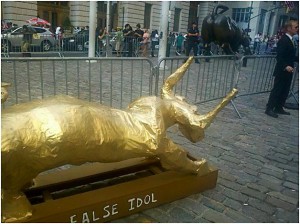 The market has become our “golden calf,” our idol of ultimate allegiance… This is when God—and then Moses—got angry. Why? Just because they built a golden calf? No. The calf could have been just a work of art, a statue to enjoy. What made the calf an idol was that the people gave the newly created calf the credit for leading them out of Egypt. They gave to the golden calf credit and attributes that belong only to God…
The market has become our “golden calf,” our idol of ultimate allegiance… This is when God—and then Moses—got angry. Why? Just because they built a golden calf? No. The calf could have been just a work of art, a statue to enjoy. What made the calf an idol was that the people gave the newly created calf the credit for leading them out of Egypt. They gave to the golden calf credit and attributes that belong only to God…
Today, instead of statues, we have hedge funds, mortgage- backed securities, 401(k)s, and mutual funds. We place blind faith in the hope that the stock indexes will just keep rising and real estate prices keep climbing. Market mechanisms were supposed to distribute risk so well that those who were reckless would never see the consequences of their actions. Trust, security, and hope in the future were all as close to us as the nearest financial planner’s office. Life and the world around us could all be explained with just the right market lens. These idols were supposed to make us happy and secure and provide for all our needs. Those who manage them became the leaders to whom we looked, not just for financial leadership, but direction for our entire lives. That is idolatry.
Rich and poor alike were sucked into making heroes out of those who seemed to be able to turn everything they touched into gold. Holocaust survivor and Nobel Peace Prize recipient Elie Wiesel lost virtually all of his personal wealth and his foundation’s, up to $37 million, to Bernie Madoffs Ponzi scheme. “We gave him everything, we thought he was God, we trusted everything in his hands.”‘
(All pictures are courtesy of Catholics United, who produced the ‘golden calf’. Extracts come from pages 19-29 of the hardcover edition of Rediscovering Values.)
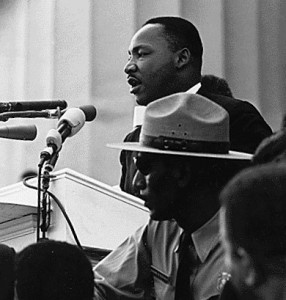 At the dedication ceremony for the Martin Luther King, Jr. Memorial, at least two speakers -- the Rev. Bernice King, Martin Luther King's daughter, and the Rev. Jesse Jackson, one of King's lieutenants -- reminded us that at the end of King's life he was planning the Poor People's March
At the dedication ceremony for the Martin Luther King, Jr. Memorial, at least two speakers -- the Rev. Bernice King, Martin Luther King's daughter, and the Rev. Jesse Jackson, one of King's lieutenants -- reminded us that at the end of King's life he was planning the Poor People's March
The Poor People's March is an ancestor to the current Occupy Wall Street movement that we see breaking out across the globe today. The idea was to bring poor people from across the color line -- white, black, brown, red, yellow -- to Washington to call attention to the importance of economic justice. King understood that economic justice -- distributive justice -- was not a matter of race in the United States.
It was true then, and it is true now that African Americans and Latino/as suffer disproportionately from income inequality. But it is important to remember that people of all colors suffer from the corrosive effects of income inequality. Some of the poorest communities in the country are European American. The poorest states in the United States with some of the worse educational and health care outcomes are states in the former confederacy.
Income inequality has increased since 1968. So the question that insists upon being answer is this: Why has income inequality worsened between 1968 and today?
Interfaith Worker Justice has published a Prayer Service designed to help people reflect on a moral economy within the context of their religious tradition. Written for clergy and religious leaders, the prayer service is aimed for those Occupying Wall Street and other cities, and for congregational use.
Editor's Note: HuffPost Religion is running a series of posts by Sojourners' Director of Mobilizing Lisa Sharon Harper and D.C. Innes, her co-author on the new book, Left, Right and Christ: Evangelical Faith in Politics, about how Christians should view social issues. Their first issue is Occupy Wall Street.
After an hour or so of echoing statements of faith, prayers and petitions aloud and in unison, when the hundreds-strong crowd began to disperse, I caught up with one of the event's organizers -- the Rev. Michael Ellick of New York City's Judson Memorial Church.
Standing at the top of a flight of stone stairs at the west end of the park, looking down on the massive crowd as it moved through the rabbit warren of tarpaulins, lean-tos and the occasional portable sukkah (it is Sukkot, after all) below, I turned to the vaguely weary clergyman and asked, "So ... what now?"
Churches play the unique role of seeing the big picture. We can call out the values and virtues of the issues. Let's not just worry about the poor in our own communities, but the poor everywhere, the people everywhere who are struggling. We can't be private anymore. We must be living water for all people.
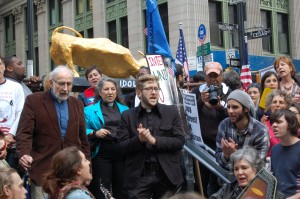 People everywhere are leaving their private spaces and gathering together -- that's already church. This is a Holy Spirit moment.
People everywhere are leaving their private spaces and gathering together -- that's already church. This is a Holy Spirit moment.
Sunday afternoon in Lower Manhattan, I ran into Salman Rushdie, who was walking nonchalantly through Zuccotti Park with his son. The renowned author's presence went largely unnoticed by the thousands of protesters, media and tourists crowding the park observing the Occupation demonstration.
On his way out of the park, Rushdie graciously took a few moments to talk with me about what he'd just witnessed. It was his first visit to the demonstrations and he was clearly moved by what he saw.
The clean up of Zucotti Park -- announced by New York City Mayor Michael Bloomberg yesterday -- by city workers has been scrapped as of early Friday a.m.
The announcement came shortly after 6 a.m. EST, less than an hour before city workers were scheduled to enter the park near Wall Street where thousands of demonstrators have been camped out for nearly a month.
Bold leadership means that Mayor Bloomberg should do what he can to allow these protests to continue, even if he doesn't agree with them. As an elected official, it is essential that the mayor find a way to protect demonstrators' free speech and right to assemble.
The freedom to protest is one of the things that has made this country great and its abridgement is an affront to us all.
You have awakened the sleeping giant, too long dormant, but ever present, deep in the American democratic spirit. You have given voice and space to the unspoken feelings of countless others about something that has gone terribly wrong in our society. And you have sparked a flame from the embers of both frustration and hope that have been building, steadily, in the hearts of so many of us for quite some time.
Throughout history, often it has been left to the youth of a society to do that, and you boldly have stepped into the role of the emerging generation, which sometimes means saying and doing what others only think. You have articulated, loudly and clearly, the internal monologue of a nation.

